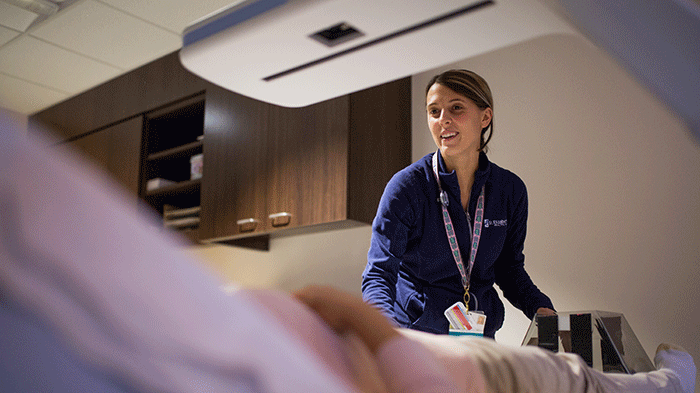As we age, we take every precaution with our skin – wearing a hat, using sunscreen and applying moisturizer regularly. However, what are you doing to protect what’s under your skin?
Our bones are a critical piece of our overall health. Our bones keep our spine straight and help us stay active in everyday life without the risk of easily fracturing a bone. Just like our skin, our bones need checkups and maintenance.
The month of May is Osteoporosis Awareness Month, and our team of bone density experts at St. Elizabeth Healthcare are informing the Northern Kentucky community about a variety of bone care resources available. From creating a calcium-rich diet to discussing low bone density treatment options, our experts are here to help you take charge of your bone health.
Who needs a DEXA scan?
At St. Elizabeth, we measure your bone mineral density with a DEXA (dual-energy X-ray absorptiometry) scan – a quick, simple and non-invasive test. Our certified bone densitometrists at St. Elizabeth Women’s Health focus on the bone mineral density measurements in the hip and spine bones, which help to reliably diagnose osteoporosis and determine your risk of a future fracture.
“We use the data from the DEXA scan pictures and compare it to a healthy 30-year-old’s bone density,” says Debbie Moellman, a Bone Densitometrist at St. Elizabeth Healthcare. “This data tells us how much bone density loss has occurred.”
Because bone loss is gradual, typically you don’t have any symptoms until you suffer from a fracture. However, using DEXA scans can help your physician:
- Predict your fracture risk for the next ten years.
- Determine your rate of bone loss.
- Monitor the effects of osteoporosis treatment.
- Find undetected vertebral fractures, which can have a significant impact on your health if left undiagnosed.
Nutrition for your bones
Look for foods high in calcium to help strengthen your bones. Our dietitians suggest milk, yogurt and cheese, as well as calcium-rich spinach, broccoli and white beans. Almonds are also a quick, delicious and nutritious snack that can help boost up your calcium.
The National Osteoporosis Foundation recommends that you get your calcium from food first. Over-the-counter calcium supplements are also available to help bump up your daily calcium intake to 1000 -1200 mg per day if necessary. Your body can only absorb about 500 mg of calcium at a time, so experts suggest spreading your intake of calcium throughout the day.
Don’t forget about Vitamin D – your body needs this vitamin to absorb calcium. Ask your healthcare provider how much Vitamin D is recommended for you and if your Vitamin D levels should be checked.
Building it back up
There is good news: even if your bone mineral density is low, there are ways to regain some of it and prevent further bone loss. Our specialists recommend a DEXA scan every two years to check on your bone density’s progress.
“If you’re in the osteoporosis range, there are lots of options to help build your bone density,” says Dr. Christine Kennedy, a Radiologist at St. Elizabeth Healthcare. “Making changes to your nutrition can help, and so can exercising regularly. We also have medication options for osteoporosis that your physician will discuss with you.”
For osteoporosis prevention, there are two types of exercises that are important for building and maintaining strong bones: weight-bearing and muscle-strengthening exercises. Many older adults don’t want to take on a new exercise routine, and that’s understandable. Our experts recommend walking, yoga or Tai Chi – helping to improve your strength, flexibility and balance as well as to prevent falls and fractures.
For more information on bone health or to schedule a DEXA scan, please call St. Elizabeth Women’s Health Center at (859) 655-8777. DEXA scans are covered by insurance and require a physician referral.

